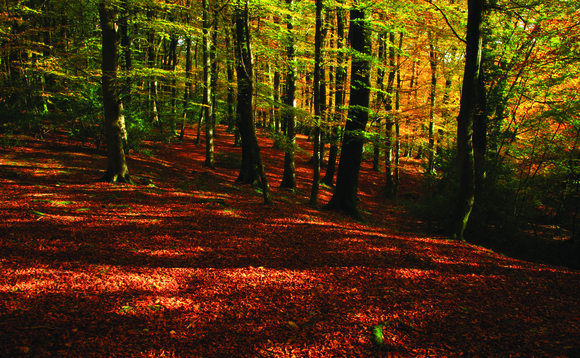
The conservation charity has commissioned new research which demonstrates younger generation is increasingly worried about climate change and has limited access to green spaces
"Drastic action" is required to increase the dwindling stock of UK woodlands to help tackle the climate and nature crisis, as well provide increasingly anxious younger generations with access to green spaces which can improve their mental health.
That is the stark warning today from the Woodland Trust, after it commissioned new research into how nature loss is playing into a growing sense of 'eco-anxiety' among the public.
The Woodland Trust warned that the UK currently has just 13 per cent of woodland cover, of which only seven per cent is good ecological condition, compared to a European average of 37 per cent.
Dr Darren Moorcroft, chief executive at the charity, said a lack of access to nature was having a detrimental impact on both environmental and mental health. "Trees and woods are integral to tackling both the nature and climate crises, but many young people miss out on both the physical and mental health benefits of being among nature," he said. "We know government recognise this and have ambitions to stave the freefall in nature by 2030, hit net zero by 2050 and give everyone access to a green or blue space within 15 mins walk of their home by 2030. All the targets are right, but action is sorely missing."
Fresh findings from a YouGov survey commissioned by the Woodland Trust found that young people aged between 16 and 24 are increasingly anxious about climate change, with one in three stating they are scared for the future.
In addition to this growing sense of fear, the survey also found that 34 per cent of 16 to 24 yea olds said they felt sad about the escalating climate crisis, and a further 28 per cent said they felt overwhelmed.
In addition, almost one in four of those surveyed said their fears over climate change mean that they would be willing to consider, or have already decided, to have fewer children than they would otherwise like.
The research also showed that although seven out of 10 young people reported feeling anxious about climate change and its effects, 86 per cent of respondents said they felt that being outdoors and among nature had a positive effect on their mental health.
"Young people are experiencing an epidemic of climate anxiety and are increasingly worried about the health of the planet," said Moorcroft. "This new data shows that climate change is jeopardising more than just the environment, with people's mental well-being and future life plans also affected. We know that being outdoors and among nature has a positive effect on mental health - but the level of access to green space in the UK is simply not good enough."
According to its 2021 study on the state of the UK's woods and trees, only 16.2 per cent of people have access to at least two hectares of green space within 500 metres of their home, down from 21.1 per cent in 2016.
With the rise om climate anxiety, Hayley Jarvis, head of physical activity for the mental health charity Mind, said that outdoor activities can be a great way of boosting mental wellbeing.
"Ecotherapy, a type of formal treatment which involves doing activities outside in nature, can be as effective as antidepressants in treating mild to moderate depression and anxiety," she said.
"Getting away from modern life and into a relaxing outside space can allow us to switch off from everyday pressures, help relieve stress, and give us time to clear our heads."
With more than 1,000 woods across the UK, the Woodland Trust suggested that its woodlands could be the "perfect" way to get into nature therapy.
In a bid to preserve and increase the amount of woodlands in the UK, the Woodland Trust recently launched its 'Plant More Trees' campaign which has a mission to plant 50 million more native trees across the UK by 2030, which the woodland conservation charity said could "create a greener, healthier world for people and wildlife."
The findings from the YouGov poll suggested that young people were also largely in favour of this initiative, with three quarters of all respondents saying that they would be willing to plant, or have already planted, trees.
The Woodland Trust said that it has already planted more than eight million trees in tree planting campaigns since 1972 with young people and children.